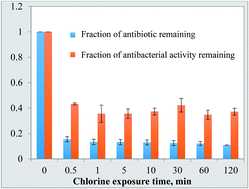This study investigated the effect of chlorine disinfection on the following commonly prescribed antibiotics typically present in treated wastewater: ciprofloxacin, trimethoprim, sulfamethoxazole, levofloxacin and ofloxacin. Antibacterially active transformation products formed from all of the fluoroquinolone class antibiotics: ciprofloxacin, levofloxacin and ofloxacin. Trimethoprim and sulfamethoxazole did not form products with detectable antibacterial activity. Experiments were performed in both ultrapure water and wastewater effluent. HPLC/MS was used to propose the structures of the transformation products in samples where antibacterially active products formed. Both chlorinated and non-chlorinated products were observed. The results indicate that antibiotic transformation products with antibacterial properties form in the wastewater chlorination treatment process. These products may be a source of antibiotic resistance in the environment and warrant a further investigation of their role.

